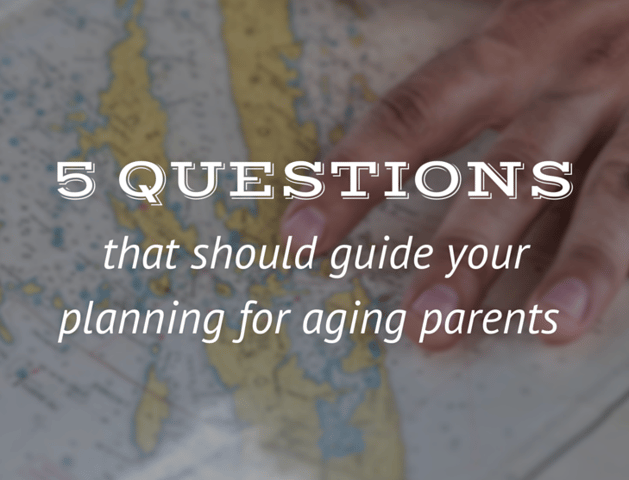
Are you becoming increasingly responsible for the welfare of your aging parents? Although you’ve got a full plate managing your own life and family, it seems that with each passing month, Mom and Dad become more reliant on you to help with even the small things. If it feels like you’re always putting out brush fires, some serious long-term planning for your parents’ future may be in order.
Here are five questions to guide your planning as you try to determine the best path for all of you.
1. How much help does mom or dad currently need each day?
To what extent do your parents rely on you for little things like grocery shopping, housekeeping, bill paying, or appointment scheduling? When you visit, are they mobile and steady on their feet? Are they keeping up with personal hygiene and wearing clean clothes? Are their moods relatively stable?
An older adults can sometimes experience quick declines in their ability to get around or think clearly, putting them at great risk. If they can’t cook a meal safely and store leftovers correctly, foodborne illnesses can result. If your parents can’t adhere to their medication schedules without constant reminders, this, too, is a concern.
If your aging parents are still driving, but you learn that they are prone to getting lost or have been involved in traffic violations or accidents, they may need to surrender their licenses. This brings a whole new set of responsibilities and greater needs for daily help.
2. Can I manage this care on my own?
When red flags in the form of accidents, falls, worsening physical conditions, or dementia come with increasing frequency, your parents most definitely need help around the house. If there are no hours left in your day for your parents' increasing needs, you’ll need to seek outside help.
The Supportive Services and Senior Centers Program page on the Administration on Aging’s website has great resources to help seniors remain in their homes as long as possible while ensuring that a family caregiver doesn’t have to work alone. The Eldercare Locator can direct you to service agencies in your parents’ area.
3. Will Mom and Dad accept help?
While it may be necessary to get your parents help around the house, they be reluctant to accept this assistance. If you feel that your aging parents are stubborn and resistant when it comes to your concerns and advice, you’re not alone. In a Penn State University study published last year, 77 percent of adult children considered their parents stubborn in the face of advice about accepting help. When trying to overcome your parents’ reservations, experts suggest that you:
- Try to understand the motivation and fears behind their behavior. Is it habit, an assertion of independence, or are they confused or depressed?
- Don’t infantilize your aging parents. Treat them like the autonomous adults they are with the right to their own decisions, even if they are poor ones.
- Ask them to make the desired change for someone that they love. Motivate them with “It’s for the sake of the grandkids,” or, “It would really help me not worry so much.”
- Use an upcoming event as incentive: “You want to be here for your 50th anniversary, right?”
4. Will my parents' home remain safe?
One out of three Americans over age 65 falls each year, according to the Centers for Disease Control and Prevention. Medications, muscle weakness, and arthritis can all have an impact on balance and mobility. Are there stairs in the home, and is the floor covered with area rugs or clutter? Lack of handrails inside and uneven sidewalks outside all present safety hazards when your aging parents are living on their own.
Looking to the future, do you need a wheelchair-accessible entry ramp? Should you retrofit your parents’ bathroom to prevent hip fractures and broken bones? If they still cook, does the kitchen need to be reconfigured to provide easier-to-access storage solutions?
5. Should we start looking into retirement communities?
Even if your parents aren’t ready for skilled nursing care, many conditions and scenarios can make aging-in-place unsafe or undesirable. When you’ve explored other options, and caring for aging parents becomes unmanageable, it might be time to seek a safer, assisted living environment that provides concentrated, around-the-clock monitoring when needed.
Talk candidly with your aging parents about the benefits of residential care. Once they accept the fact that a change is for the best, enlist their participation in determining what they want their next home to offer.











